| |
The War of the
Roses
ACT TWO:
Warwick's Betrayal
|
| |
The House of
Neville
Nothing
that takes place from here will make any sense
unless we first discuss the House of Neville.
There
are two things to know about the Nevilles.
First
and foremost, the Neville wives reproduced at an
unimaginable, unfathomable rate.
Second,
they were the richest family in England which is a
good thing because they had a lot of mouths to feed.
|
|
|
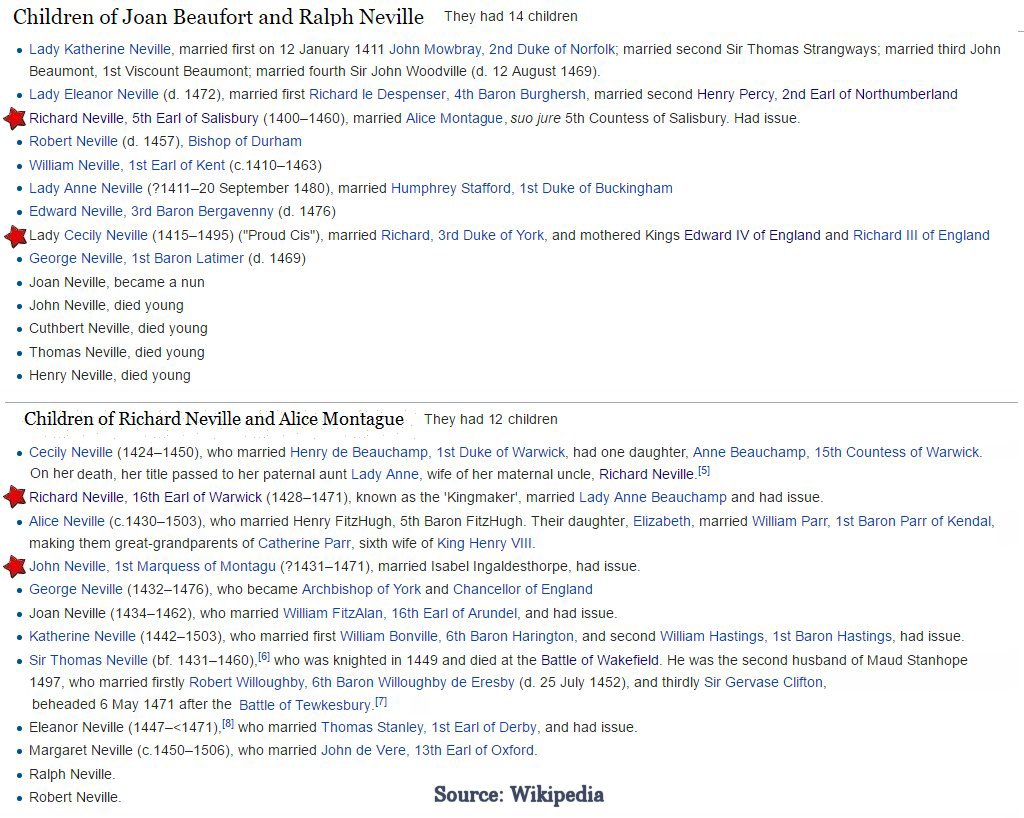 |
So far we have talked about
the Plantagenets, the Anjevins, the Lancasters, the
Beauforts, and the Yorks. Now it is time to
discuss the Nevilles.
Like everyone else in this story, John of Gaunt is
somewhere in the background of the House of
Neville. However, so is
Joan Beaufort. The House of Beaufort
will soon figure prominently in our story.
In
particular, Richard Neville, or 'Warwick' as
he was known, intermingled with the family of
Richard, Duke of York. For starters, Warwick's
Aunt, Cecily Neville, was Richard of York's wife.
Warwick
had two daughters. Isabella Neville married
George, son of Richard of York. Anne Neville
married Edward, Prince of Wales, but then later
married Richard III, son of Richard of York.
|
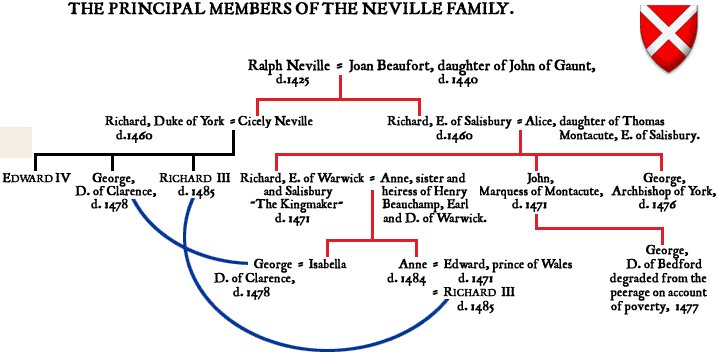 |
Cecily Neville and
Richard of York
Cecily
Neville married Richard of York in 1429. Oddly
enough, they grew up together in the same household.
Richard's mother, Anne Mortimer, died giving birth
to him. Richard's father, the Earl of
Cambridge, was beheaded in 1415 for his part in the
Southampton Plot against the Lancastrian King Henry
V. Although the Earl's title was forfeited, he
was not 'attainted'. The four-year-old
orphan Richard became his father's heir.
Within a few months of his father's death, Richard's
childless uncle, Edward of Norwich, 2nd Duke of
York, was slain at the Battle of Agincourt on 25
October 1415. King Henry V allowed Richard to
inherit his uncle's title and the lands of the Duchy
of York. The lesser title of the Earldom of
March also descended to him on the death of his
maternal uncle Edmund Mortimer, 5th Earl of March.
Here is
what is interesting. Richard of York may have
been an orphan, but he was also to become the
wealthiest and most powerful noble in England,
second only to the king himself.
As he was an orphan, Richard's income was managed by
the Crown. The Wardship of such an orphan was
therefore a valuable gift of the crown. In
October 1417 this was granted to Ralph Neville, 1st
Earl of Westmorland, who adopted Richard probably
because Ralph Neville didn't have enough children of
his own. Mind you, I am telling a little joke
here. Ralph Neville had a problem... he had
lots of daughters and needed some suitable husbands
for them. Neville had fathered an enormous
family (twenty-three children, twenty of whom
survived infancy, through two wives). With so
many daughters needing husbands, Ralph Neville
basically went out and bought one for Cecily.
As was
his right, in 1424 Ralph Neville betrothed the
13-year-old Richard to his daughter Cecily Neville,
then aged 9. This was a bit on the weird side
since Cecily was growing up right beside Richard.
This was like Greg marrying Marcia on the
Brady Bunch. However, they obviously
overcame any reticence. Cecily and Richard
would have 13 children. Like I said, those
Neville girls knew how to reproduce.
The major point is that Richard of York grew up as a
Neville and maintained close ties with the family
throughout his life. Richard's wife Cecily was
a Neville and Richard Neville, Earl of Warwick, i.e.
The Kingmaker, was his closest advisor.
|
| |
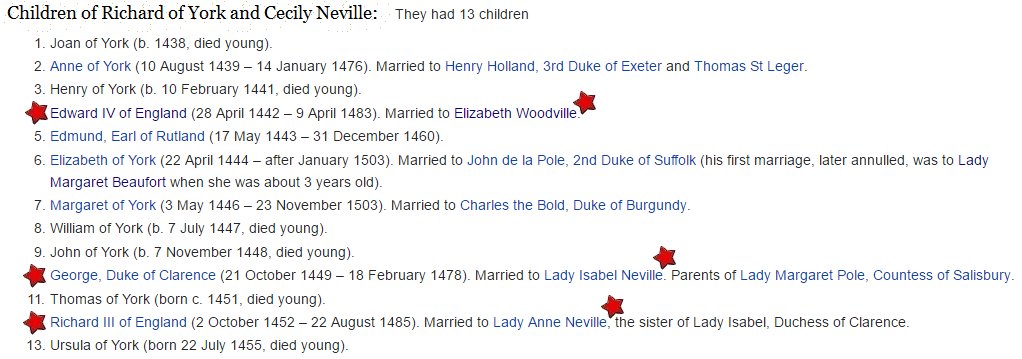 |
| |
|
|
|
Elizabeth Woodville
|
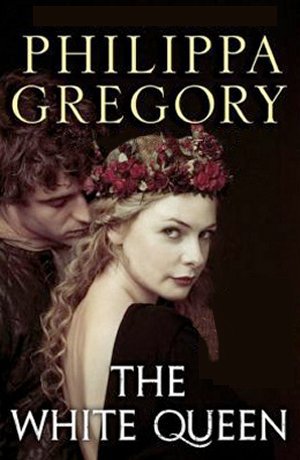 |
While the thirty year War of the Roses was
quite the bloody matter, it had the redeeming
quality of being centered around a very curious
romance. Believe it or not, Edward had
the nerve to marry an upstart. And get this...
Edward did for it love. Can you imagine that?
The
scandal was unbelievable. No one married for
love back in Old England. Strangely enough,
Edward's decision was so upsetting that it would
create Chapter Two of the War of the Roses.
Richard Neville, Earl of
Warwick, 'The Kingmaker', was the man who had
put Edward IV on the throne. Warwick and
Richard of York saw eye to eye on many things.
After Richard of York died at Wakefield, Edward IV,
depended greatly on the patronage of Warwick for
advice, for fighting men, and for political
influence.
Edward was 19 when he became
king and Warwick was 33. One can imagine
Warwick's relationship with Edward was that of an
older brother and a mentor. At this point, Earl of Warwick saw
himself as Edward's closest confidant and the power behind the throne.
One can also imagine that Warwick believed that
Edward 'owed him' for making him King in
1461. Three years had passed. At the
moment, Warwick was in France pursuing a suitable political
marriage on behalf of Edward.
Warwick had made preliminary
arrangements with King Louis XI of France.
Edward would either marry either Louis' daughter
Anne or his sister-in-law Bona of Savoy. Warwick
had done a good job... he
had the daughter of the King of France lined up.
Not bad.
But then Edward went and botched everything up.
Ordinarily an English King marries a suitable girl.
Then if by chance he met a hottie in the woods, he has the sense to
take the young lady to a convenient
cottage somewhere. That is exactly what Edward had in mind when
one day he just happened to meet
Elizabeth Woodville in the forest of all places.
Their meeting reads like a Fairy Tale. The
only way to make it any better would be to name the
forest 'Woodville' as well.
|
| |
|
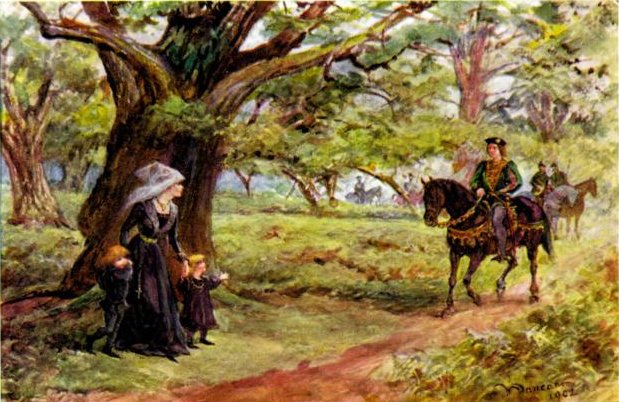 |
Who was
Elizabeth Woodville and what she doing here in
Woodville? Elizabeth was an impoverished widow with
two hungry sons to feed. In 1452 Elizabeth
had married Sir John Grey. John Grey was a
supporter of the Lancastrian cause who died fighting
at the Second Battle of St Albans in 1461 against
Edward, Duke of York.
Disastrously for Elizabeth, after Grey's death, her
mother-in-law refused to pay her dower from the
family estate. Only the king himself would be
able to enforce her rights.
As the
wife of a leader on the losing side, Elizabeth
Woodville was now a penniless outcast without an
estate. She was forced to return to
live with her parents in Grafton.
Three
years had passed since her husband's death.
One day in 1464, Elizabeth learned that Edward
was in the area to recruit new men for his army.
Even better, the king was hunting in a forest near Grafton. Elizabeth
deliberately
hid behind a tree and stepped out onto
the road with her two boys as young King Edward
passed by on his horse.
|
| |
|
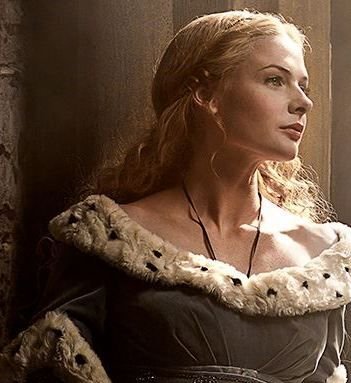 |
Edward was a known ladies man with a different
mistress stashed in virtually every shire of the
Kingdom. Noticing that Elizabeth was unusually
beautiful, the king stopped.
Edward climbed off his horse and began to chat.
Elizabeth used her opportunity to plead for the
return of her husband's estates. Edward
was smitten. He immediately suggested they
meet at a nearby cottage to further discuss the matter
of Elizabeth's lost estate, but
Elizabeth turned him down. Edward, a notorious
womanizer, was unaccustomed to rejection. He
continued to pursue Elizabeth and she continued to
keep him at arm's length.
Elizabeth may have been a commoner, but she knew how
to use her uncommon beauty to great effect.
Edward became very intrigued. Here
was a woman who had so much to lose if he failed to
grant her wishes. She maintained her virtue
nonetheless. Edward
began to admire Elizabeth not just for her beauty,
but for her determined refusal to be his mistress.
Finally
Edward couldn't take it any more. Edward was
full of desire for this fetching woman.
Elizabeth not only had the beauty he desired in a
wife, she possessed a strong, virtuous character.
Edward proposed and the two of them had a secret
marriage.
Soon
after, King Edward IV,
England's most eligible bachelor, shocked the nation
when he announced he had taken a
bride. Elizabeth Woodville, the impoverished
widow with two young sons, was the new Queen of
England.
|
| |
|
Angry Reaction
to the Edward's Surprise Marriage
|
|
|
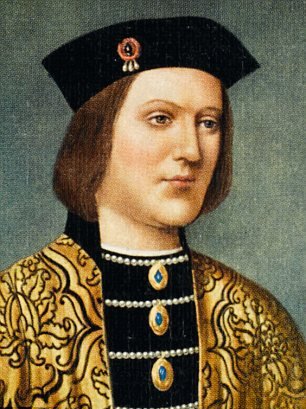 |
The
wealthy elite of England were aghast. The
match was badly received by the Privy Council.
"Surely, Edward, you must have known that this is
no wife for a prince such as yourself."
Yes,
Edward knew full well that he was in trouble.
He had knowingly backed out of an arranged marriage
without consulting Warwick, the man who had gone to
considerable trouble to arrange a suitable marriage
for Edward. Warwick was furious about Edward's
surprise marriage. Edward had
gone and done something stupid without even speaking
to him. Warwick was the one who would have to
apologize to the King of France. Warwick felt humiliated and
betrayed. After all he had done to help
Edward, he expected to see some respect and maybe
even a little gratitude.
Margaret
of Anjou was disgusted.
Margaret was
still determined to win
back her son's inheritance.
After the Battle of Towton, she fled with
her son
and husband to Scotland
and then on to France.
From there, Margaret fumed. As soon as Edward
had a male heir, it was all over for her son.
Edward's mother Cecily
Neville was unusually bitter at her oldest son. Cecily Neville was at
the very top of the social scale in late medieval
England, and held the highest status any woman could
enjoy. Cecily felt both Elizabeth and the
entire Woodville family were social upstarts
"I
think of this commoner
strumpet waiting for the King of England
under an oak tree, as if she just happened to be
by the roadside, a hedge-witch casting her
spells on a gullible fool
such as yourself. I did not raise you to
fall for the
amorous glance of a
slut strutting her well-worn wares
in the forest."
|
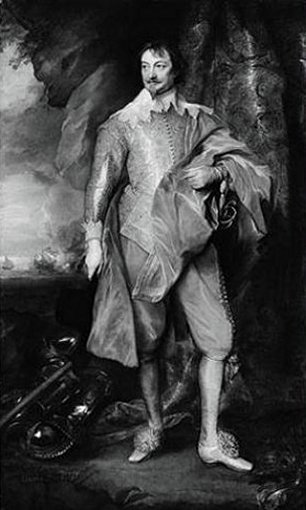 |
The Kingmaker
Warwick
became the central figure in the Second Chapter of
the War of the Roses. He bore a grudge towards
Edward that simply grew worse. In a sense, he
possessed the same burning ambition as his deceased
ally Richard of York. Warwick knew he could
not be king, but he was willing to settle for being
the man who decided who would be the king. And
for that matter, Warwick was determined to make one
of the two daughters, Isabella and Anne, the next
Queen.
Edward's
marriage to Elizabeth initiated the rift in 1464.
The animosity between the two men widened year by
year. Warwick was angry about everything to do
with Edward. And he hated Elizabeth just as
much. Elizabeth considered Warwick dangerous
to the extreme.
Elizabeth was right, but her husband constantly
sought to appease his former mentor. It did
not good. Warwick did not approve of anything
Elizabeth did. With the arrival on the scene
of the new queen came many of her relatives.
Elizabeth's twelve unmarried siblings suddenly
became very desirable matrimonial catches.
Warwick watched with disdain as Elizabeth's marriage
greatly enriched her siblings and children.
Some were appointed to royal offices, some married
into the most notable families in England, some did
both.
The
major reason for Warwick's hostility was his
increasing loss of political influence. These
people were upstarts, pretenders. These people were
getting in his way. Warwick's animosity grew
as the Woodvilles opposed policies favored by
Warwick. Seeing the upstarts successfully
exploit their influence with the king to defeat him
grated at Warwick no end. Warwick refused to
let his alliances with the most senior figures in
the English Council and the divided royal family be
compromised. When Elizabeth Woodville's
relatives, especially her brother Anthony Woodville,
2nd Earl Rivers, began to challenge Warwick's
pre-eminence in English society and political
circles, Warwick decided he had to do something.
Three
years had passed since Edward's marriage to
Elizabeth. During this time, Warwick had
become progressively more alienated from King
Edward. Now his intentions turned toward
treason.
|
Games of
Thrones Revisited
Rick's Note: Let's put our story on pause
for a moment while I remind everyone that
there are entire websites devoted to
comparing the real life characters in the
War of Roses to George RR Martin's fictional
Game of Thrones characters.
Margaret of Anjou is Cersei. Richard
of York is Ned Stark. Ned Stark had
his head on a pike. So did Richard of
York.
Lord Walder Frey is the equivalent of
Warwick. Lord Frey supported Robb
Stark’s military action by letting Robb's army
cross the bridge. However, Lord Frey
expected compensation for his indispensable
support. Robb Stark promised to
marry his daughter. When Robb Stark
reneged to marry for love, Walder Frey
arranged the infamous Red Wedding.
Game of Thrones is not a direct parallel of
War of the Roses. But there are times
when the similarities are uncanny.
Given my fascination with Game of
Thrones, it is easy to understand why
I am just as fascinated by the War of the
Roses. Look what ambition does to
people.
|

Click the picture or this link
War of Roses-Game of Thrones
to view a fabulous video which explains the
War of Roses in 6 minutes. You will
understand the whole story so much more
clearly.
|
|
 |
| |
Treachery
Warwick
bore a grudge towards Edward that had become
intolerable. Years of hostility and a battle
of wills had turned into open discord between King
Edward and Warwick. Warwick decided to switch
his allegiance to the Lancastrian cause. If a
Kingmaker can make a King, then a Kingmaker can
unmake a King.
In the
autumn of 1467, Warwick withdrew from the court to
his Yorkshire estates. Now out of sight,
Warwick covertly instigated a rebellion against the
king with the aid of Edward's disaffected younger
brother George, Duke of Clarence, as well as
encouragement from
Edward's bitter mother, Cecily. Keeping in
mind that Cecily Neville was Warwick's niece,
Warwick had little trouble gaining her support.
Cecily
had never forgiven Edward for marrying such a
low-life.
From the start, Cecily had refused to subordinate
herself to the new queen, styling herself as the
true Queen, or 'Queen
by right' as she put it. Cecily had never
quite gotten over the fact that she would have been
the queen had Richard of York not been murdered.
Now her son Edward expected Cecily to show respect
to this low-born woman. Cecily would have
nothing of it. This Elizabeth woman was
beneath her, so how could her son ever expect her to
bow to such a woman who was beneath her?
Edward
could see there was no love lost between Cecily and
her daughter-in-law Elizabeth. To lessen
tensions at court, Edward IV had new Queen’s
chambers built at Westminster for Elizabeth just so
Cecily could remain in her old chambers. He
had tried to mollify his mother, but it did no good.
Cecily had left for good in a show of disgust. She had
a meeting with Warwick to attend.
|
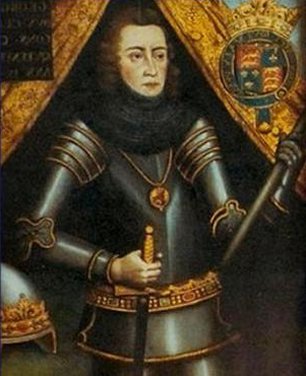 |
George
Plantagenet, Brother of Edward
If
someone was looking for a part to play in this
ongoing drama, George Plantagenet was one role to
avoid for sure. First a loser, then a winner,
then a loser again, this guy would eventually suffer a miserable
fate. The poor guy couldn't even get a decent
picture drawn.
George,
born 1449, was the middle brother between Edward,
born 1442 and Richard, born 1452. When Edward
became king, he treated both of his brothers well.
The new king was generous to his two younger
brothers. George, 11, was made the Duke of
Clarence in 1461 and the younger, Richard, 8, became
the Duke of Gloucester. From this point
forward, George became better known as 'Clarence'.
There
must be something very seductive about the idea of
becoming king. Rather than settle for the good
life he had, George was ambitious to become king
himself. Consequently George was easy prey for
the Kingmaker's promises in 1469. Not only could
George marry his daughter Isabel, Warwick would make
George the next King. How could George refuse
an offer like that? So what if his
generous brother Edward had to go? Tough luck,
bro. George allowed himself to be used
like a pawn in the ugly power struggle
between Warwick and King Edward.
|
| |
Meanwhile, Back at
the Ranch...
This excerpt
from the White Queen written by
best-selling author Philippa Gregory. Here Edward
is speaking to his wife
Elizabeth about rumors of Warwick's plot.
‘But now I have to go north and deal with this,’
Edward complains to me.
‘There are new rebellions
coming up like springs in a flood. I thought it was
one discontented squire but the whole of the north
seems to be taking up arms again. It is Warwick, it
must be Warwick, though he has said not a word to
me. But I asked him to come to me; and he has not
come. I thought that was odd – but I knew he was
angry with me – and now this very day I hear that he
and George have taken ship. They have gone to Calais
together.
God damn them, Elizabeth, I have been a
trusting fool. Warwick has fled from England, George
with him, they have gone to the strongest English
garrison, they are inseparable, and all the men who
say they are out for Robin of Redesdale are really
paid servants of George or Warwick.’
Elizabeth thinks to herself, 'I am aghast.
Suddenly the kingdom which had seemed quiet in our
hands is falling apart.'
"It must be Warwick's plan to use all
the tricks against me that he and I used
against Henry."
Edward hesitates, then begins thinking
aloud.
"He is backing George now, as he once
backed me. If he goes on with this, if
he uses the fortress of Calais as his
jumping point to invade England, it will
be a brothers' war as it once was a
cousins' war. This is damnable,
Elizabeth. And this is the man I thought
of as my brother. Warwick is my kinsman
and my first ally. For God's sakes, this
was my greatest friend. And now he has
turned on me! And turned my brother as
well. And now I hear even my
mother. My God, my own mother."
Philippa Gregory, The White Queen
|
| |
The Curious Blaybourne Allegation
| |
|
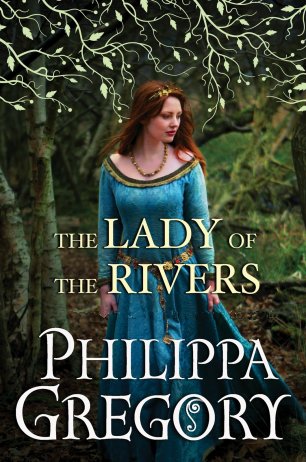

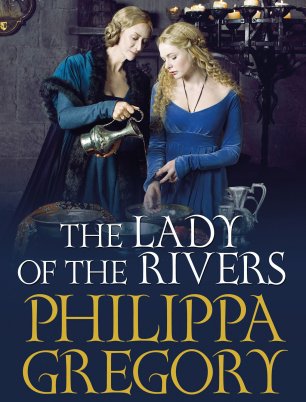 |
The following remarkable conversation takes
place in 1464 shortly after Edward has
finally revealed his secret marriage to his
mother Cecily Neville. This excerpt
was written by Philippa Gregory in her
best-selling novel The White Queen.
Jacquetta Woodville is known as the
Lady of the Rivers due to her
unusual gifts of second sight. She is
rumored to have remarkable powers of
divination. Cecily Neville is well
aware that the Woodvilles are Lancasters.
Not only that, Jacquetta became a close
confidante of none other than Margaret of
Anjou, the virago Queen herself, long before
all the fuss started.
As we know, the Duchess of York absolutely
hit the roof upon discovery of the marriage.
To her, Elizabeth is the enemy.
Desperate to calm his mother, Edward asked
Jacquetta to meet with Cecily, the Duchess,
and attempt to restore peace in the family.
Jacquetta is not welcome here. No
doubt it is Jacquetta's relationship with
Margaret of Anjou, sworn enemy of the
Neville family, that has raised Cecily
Neville's darkest suspicions about Elizabeth
Woodville. Furthermore, Jacquetta was
the only person in attendance at the secret
wedding of Edward and Elizabeth besides the
priest. It is upon Jacquetta's word
that Cecily Neville has to believe the
wedding even took place.
In attendance during this tension-filled
meeting are several of Cecily's daughters
including Margaret of York as well several
of Jacquetta's daughters including Anne
Woodville.
Anne Woodville, Jacquetta's second daughter,
narrates the story here.
Cecily Neville, Duchess of York, is
speaking to Jacquetta and the various
daughters in the room.
"Nonetheless, Elizabeth was not my
choice, nor the choice of Lord
Warwick."
Her Grace is upset, her voice
trembling with anger.
"It would mean nothing if Edward
were not king. I might overlook it
if he were a third or fourth son to
throw himself away..."
My mother (Jacquetta) replies,
"Perhaps you might. But it does not
concern us. King Edward is the king.
The king is the king. God knows, he
had fought enough battles to prove
his claim."
Cecily Neville retorts,
"I could prevent Edward from being
king," Cecily rushes in, temper
getting the better of her. "I could
disown him, I could deny him, I
could put George on the throne in
his place.
How would you like that as the
outcome of your so-called private
wedding, Lady Rivers?"
The duchess' ladies blanch and sway back
in horror. Margaret (Margaret of
York) who adores her brother Edward,
whispers, "Mother!" but dares say no
more.
Edward has never been their mother's
favorite. George, Edward's younger
brother, is his mother's darling, the
pet of the family. Richard, the
youngest of all, is the dark-haired runt
of the litter. It is incredible
that the Duchess speaks of putting one
son before another, out of order.
"How?" my mother says sharply,
calling the Duchess' bluff. "How
would you overthrow your own son?"
The Duchess replies,
"If he was not my husband's
child..."
"Mother!" Margaret wails.
"And how could that be?" demands my
mother, as sweet as poison.
"Would you call your own son a
bastard? Would you name yourself a
whore? Just for spite, just to throw
us down, would you destroy your own
reputation and put cuckold's horns
on your own dead husband? When they
put Richard's head on the gates of
York, they put a paper crown on him
to make mock. That would be nothing
compared to putting cuckold's horns
on him now. Would you dishonor your
husband? Would you dishonor your own
name? Would you dare shame your
husband worse than his enemies did?"
There is a little scream from the women,
and poor Margaret staggers as if to
faint. My sisters and I are half-fish,
not girls. We just goggle at our mother
and the king's mother go head to head.
It is like a pair of slugging battle-axe
men in the jousting ring, each saying
the unthinkable.
"There are many who would believe
me," the king's mother threatens.
Mother stares at the Duchess with
contempt.
"More
shame to you then,"
my mother says roundly.
"The rumors
about Edward's
fathering reached England.
Indeed.
I
was among the few who swore that a
lady of your house would never stoop
so low. But
I heard, we all heard, gossip of an
archer named – what was it –’
my mother
pretends to forget and taps her
forehead. ‘Ah, I have it: Blaybourne.
An archer named Blaybourne, who was
supposed to be your amour.
But
I said, and even Queen Margaret
d’Anjou, sworn
enemy of your husband, said
that a great lady like you would not
so demean herself as to lie with a
common archer and slip his
bastard into a nobleman’s cradle."
The name 'Blaybourne'
drops into the room with a thud like
a cannonball. You can almost hear it
roll to a standstill. My
mother is afraid of nothing.
Mother is not through yet.
‘And anyway, if you can make the
lords throw down King Edward, who is
going to support your new King
George? Could you
trust his brother Richard not to
have his own try at the throne in
his turn? Would
your kinsman Lord Warwick,
your great friend, not want the
throne on his own account?
Philippa Gregory, The White Queen
|
| |
|
Now we
fast-forward five years. It is 1469 and
Warwick is planning a revolt.
Warwick's
plan is to unseat Edward IV and replace him with
George, Duke of Clarence. Warwick thought it
useful to undermine Edward's legitimacy prior to
launching the battle campaign by spreading an ugly
rumor. Mind you, Cecily Neville, 54,
was Warwick's aunt and George's mother. One
has to assume that Warwick and George would not act
without her permission.
In 1469
both Warwick and George
began
to spread rumors that the king was a bastard.
People were asked to believe that his true father was not
Richard, Duke of York, but
rather an obscure archer named Blaybourne.
(Those Archers have always caused trouble!)
With Warwick pushing for the crown to
pass to her second son, George, Duke of Clarence,
there is evidence that Cecily cooperated with
the public shaming of her son. Although
Cecily said little about the matter in public,
she didn't deny it either.
After
all, this was a woman who lived for her high status
in the Royal Court.
This was not exactly the kind of information one
typically uses to advance their social standing in snooty circles...
'Hey,
girls, wanna hear some juicy gossip? Guess
what? I fucked some archer kid back in
1442 and got knocked up! Blimey,
we've got a bastard for a king! If that
doesn't beat everything...'
One
would assume a woman of Cecily Neville's importance would have
spoken up after being accused of adultery.
Instead... silence.
That speaks
volumes without saying a word.
So was
the Blaybourne rumor true or not? There are
four pieces
of circumstantial evidence to support the claim.
•
During
the critical time needed for
Edward's conception his father Richard,
Duke of York, was away
from his home base in Rouen,
France, for a period of five weeks.
He was busy
overseeing the Siege of Pontoise over a hundred miles
away, a distance which necessitated several days of marching.
In his absence, his wife
Cecily was (allegedly) having an
adulterous fling with an archer by the name of Blaybourne.
•
Further
evidence reveals that Edward's
ho-hum baptism
ceremony was held in a
side chapel in stark contrast to
the glorious baptism
of his next brother, Edmund.
•
Cecily Neville did not publicly recant.
•
Oh,
one more thing, Edward was tall and fair
and did not look
a bit like his
father, short and dark.
So was
Edward illegitimate? Maybe. Maybe
not. 650 years after the fact there are
lengthy blogs all over the Internet written by
people who claim to know the truth. Each
person offers compelling reasons why they are right
and why the next guy or gal is wrong.
If the
allegation was true, the assumption would
have meant that George was
the rightful king. Therefore
Warwick was using this as his rationale to put the
rightful king on the throne. Oh, how noble of
Warwick to spare England the shame of yet another illegitimate
king!!
What makes
all of this so hypocritical is that William the
Conqueror was illegitimate. No one
questioned his right to rule, so why should it
matter in the case of Edward? After all,
Edward's father never said a word. No doubt
Richard was able to count the weeks as well as
anyone. If anyone
should be upset, it should have been him.
Therefore, what difference did it make?
Here are
the facts.
Richard of York
loved his son Edward and the feeling was mutual.
Edward risked his
life in battle after battle trying to make his
father the next king. When Richard
fell, it was Edward who vowed to avenge his father.
Edward won the brutal Battle of Towton, the most
horrible skirmish in English history, despite being
badly outnumbered. It takes considerable guts
to stand up and fight against larger forces.
28,000 men died and now suddenly people are supposed
to care who his mother slept with? If
anything, the entire nation should have been up in
arms against his mother. This was her doing,
not Edward's. I guess one
has to be British to understand.
Why would
Cecily and Warwick stoop so low? Oh, forget
about Warwick. He had no more scruples than a
shyster lawyer.
To me, the
real story here is that Edward's mother would
cooperate with this mockery. Even if this
story was true, what did Edward ever do to his
mother to deserve her treachery? Okay, so Edward
married a sexy wood nymph instead of a proper French girl with a pedigree and a
big dowry. Get
over it!!
A normal mother would
have been proud out of her mind. Not Cecily.
Cecily allowed her contempt to dominate her sense of
decency.
Look at
Edward... a courageous man who had fought bravely to
become the King of England!!!! Whether
Edward was legitimate or illegitimate, for God's
sakes, why would a mother hurt her son like this?
Even if Edward was illegitimate, it wasn't his
fault. Cecily had abandoned her son.
What in the hell was wrong with
this woman?
|
 |
In 1469,
with his influence at
the
English court waning,
Warwick had
won over Edward's brother George. With full
approval of Warwick's aunt Cecily Neville, Warwick
pledged his daughter Isabel in matrimony and
promised to install George as the next king with
Isabel as queen. The nineteen-year-old George
had shown himself to share many of the abilities of
his older brother, but was also jealous and
overambitious. In July 1469, the two sailed
over to Calais where George was married to Isabel.
From there they returned to England, where they
gathered the men of Kent to join the rebellion in
the north.
Edward had taken his eye
off the ball. The main part of the King's army
(without Edward) was defeated at the Battle of Edgecote Moor on 26 July 1469. This defeat
would not have been decisive if Edward himself had
remained at liberty, but he walked right into a
trap. Heading north to meet up with his
retreating army, Archbishop Neville, brother to
Warwick, had been lying
in wait. Edward was subsequently captured at
Olney. Although treated with formal respect,
Edward was nonetheless imprisoned.
Sad to say, Edward was largely to
blame for the humiliating debacle of July 1469. His
complacency shows that he underestimated the extent
to which he had lost popular sympathy. In addition,
he seemed unable to accept the extent of treachery
within his own family. Denial was the only possible
explanation for his hopeful loitering for three
weeks while the rebels organized.
His blunder into captivity further
underscored his lack of appreciation for the danger
he was in. Above all, Edward had failed to
appreciate just how little his government had
succeeded in winning popular support when faced with
a rival of Warwick's considerable reputation.
However, strangely enough, Warwick
was unable to exploit his stunning victory. He
found himself politically isolated. The English
Council refused to cooperate. Warwick needed more
backing for his illegal usurpation,
especially he intended to shove George,
Duke of Clarence, down their throats.
The people of London took Warwick's
triumph as a license for violence. They began to
riot and pillage. There
were local revolts throughout the land when some of
the nobility seized the chance to settle their
private quarrels without interference from the
government. To his
dismay, Warwick discovered he could get no response
to his proclamations calling for troops as long as
the people believed the
king was a prisoner. Warwick shrugged his shoulders
in bewilderment and
resignation. The people of
England had spoken. Only the moral authority
of the king could command their
obedience.
In disgust, Warwick was forced
to release Edward on 10 September 1469.
By October Edward's power
was restored.
An
important lesson had been learned here. In
order to rule a Kingdom, even a powerful man like
Warwick could not succeed without the will of the
people. The coup d'état may have failed, but
this was a very close call.
One has to wonder.
Edward had been betrayed the man who had once been
like a father to him. He had been betrayed by
his brother. And he had been betrayed by his
own mother of all people.
Prior to reading this story,
the only place where people behaved this badly was
on the Game of Thrones. It is
shocking to discover what I thought was escapist
nonsense could be possible in the Real World.
|
| |
An Uneasy Peace
During Edward's capture, Elizabeth had been terrified
her husband would simply be murdered. Why Warwick didn't simply murder Edward is an
interesting question. Warwick was apparently
content with the overthrow of the Woodvilles.
Believing that he had secured Edward's submission,
perhaps Warwick . No doubt if Margaret of
Anjou had been involved, Edward would be dead now.
The one thing Elizabeth knew was that Edward would
never be safe as long as Warwick was around.
She was right.
Edward had been released
unharmed in October 1469. At this point,
Edward did not seek to destroy either Warwick or
Clarence. He allowed them to retain their
estates and sought reconciliation instead. In
retrospect, Edward should have listened to his wife
who had suggested destroying both of them for
treason.
Although the king
refrained from punishing the rebels,
he sought to reestablish a
northern counterweight to the Nevilles by restoring the
earldom of Northumberland to the dispossessed heir,
Henry Percy. This turned out to be a
fateful move because it meant depriving John Neville, who had
remained loyal to the king when his brothers rebelled,
of his title, lands and offices.
Edward sought to retain
John's allegiance by compensating him with estates in
the south-west, the new title of Marquess of Montagu,
and the betrothal of his young son George Neville to the
king's eldest daughter and current heir, Elizabeth of
York. George was made Duke of Bedford in recognition of
his future prospects. All this, however, evidently
failed to sufficiently mollify Montagu.
Soon after a private feud
broke out in Lincolnshire between Sir Thomas Burgh
of Gainesville and Lord Welles. Warwick saw
this as an opportunity to lure Edward up north into
a trap. In March 1470, Warwick and George
helped enflame this ongoing skirmish into a serious
problem. Now King Edward was certain to ride
up to the area and restore peace. Edward did
not suspect that Warwick and George would be waiting
for him. Their plan was to ambush Edward and
assassinate him during the ensuing battle, thereby
suffering the same fate as his father had at
Wakefield ten years earlier.
Warwick's plan had bad luck.
Sir Robert Welles, a co-conspirator, gave battle at
Losecoat Field prior to planned trap and was utterly
defeated. He was captured holding documents
that proved the complicity of Warwick and George.
Welles confessed his treason and named Warwick and
George as the 'partners and chief provokers'
of the rebellion. Welles was beheaded, but
Warwick and George were able to flee the country and
go to France.
Warwick was relentless.
He vowed to try again.
|
| |
The Unholy
Alliance
Now an
outlaw, Warwick turned
to Louis XI to see if the French king would help him
mount another rebellion.
Louis XI
had a suggestion for Warwick.
Why not go talk to
Margaret of Anjou??
Margaret
despised Warwick. They had been rivals for
twenty years. How could Margaret forget the
Second Battle of
St Albans? This was the day
she personally
defeated the Yorkist forces of Richard Neville, Earl
of Warwick. Her triumph
rescued her husband Henry
VI being held illegally by Warwick.
With
Louis XI acting as peacemaker, with some difficulty
Warwick showed rare humility and reconciled with
Margaret of Anjou. Both parties reached the
same conclusion... I don't like this person, but the
enemy of my main enemy is my friend.
In
return for the help of Margaret and Louis XI,
Warwick vowed to restore King Henry VI back to the
English throne. Warwick also agreed to marry
his second daughter Anne Neville, 14, to Margaret's
son Edward of Lancaster, 17, to seal the deal.
Louis
was so pleased, he offered to back the next
invasion. Warwick was heard to say, "Louis,
I think this is the start of a wonderful friendship."
Or was it someone else who said that?
|
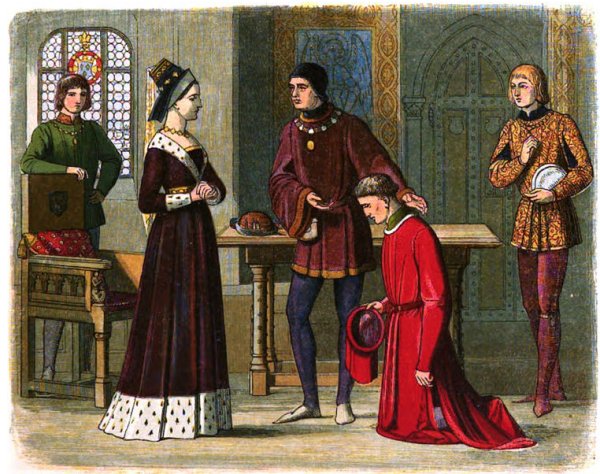 |
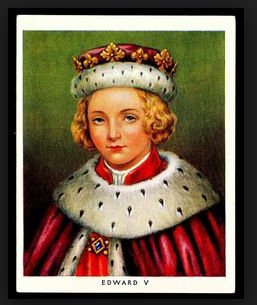 |
The Little Monster
Edward
of Lancaster or Edward of Westminster or Edward V,
whatever, was the only son of Margaret of Anjou.
If Margaret's counterpart on the Game of
Thrones is Cersei, can you guess who
Edward's counterpart on the show might be?
Think about it. I will answer in a moment.
As
presumptive heir to the throne, Edward was literally
Margaret's only reason to carry on. Margaret
had likely committed adultery to conceive him, she
had engaged in endless plots to restore his
birthright, and she now she had done the unthinkable
by accepting help from Warwick, the Devil himself.
Warwick was virtually Edward's last remaining hope
of becoming king of England.
Prince
Edward had been born right in the midst of Richard
of York's surge to power in 1453.
Consequently, Edward's entire life had operated as a
leitmotif for the War of Thrones, or Game of Wars,
whatever. Who could possibly count how many
men had already died so this little kid could keep
hoping to be king someday? Nor was it over.
It was now 1470 and Warwick planned to attack again.
|
|
|
Edward
is none other than Joffrey, definitely the most
hated character on the show (or at least he was
until Ramsey Bolton came along). There was an
incident in Season One where young Joffrey told a
horrible lie. This lie caused the death of an
innocent butcher boy as well as the execution of the
loyal direwolf that had protected Arya from being
stabbed by Joffrey's sword. Watching that
magnificent animal die broke my heart.
It turns
out that Edward was just as vile as his fictional
counterpart. Reports paint Edward of
Westminster as a bad seed, violent and obsessed with
war. There is a well-documented story
that took place at the 1461
Second Battle of
St Albans. In this battle,
Margaret clearly outfoxed Warwick and his brother
Montagu. Soundly beaten, Warwick and Montagu
had no choice but retreat. In the process,
Warwick left behind the bemused King Henry,
who had spent the battle
sitting under a tree, singing.
Two
Yorkists knights,
Lord Bonville and Sir Thomas Kyriell, had sworn to
let their prisoner come to
no harm during the battle.
Even now after the fighting had ended, they
remained beside him
to ensure a safe transfer.
King Henry had promised the two knights
immunity, but Margaret gainsaid him and ordered
their execution.
Margaret
wanted vengeance, so she put the men on trial at which her son presided.
"Fair son",
Margaret asked, "what death shall these
knights die?"
Despite
Henry's desperate
pleas for mercy, Prince
Edward, 8, replied that
their heads should be cut off.
The boy clapped
gleefully as the men suffered their cruel fate.
|
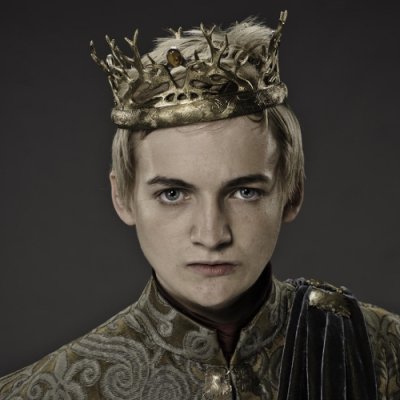 |
| |
|
There is
an interesting footnote to this story. As we
know, what goes around, comes around.
John Neville, aka Montagu,
was also captured
in this battle, but he had been spared
a similar execution.
It turned out he was saved by the Duke of
Somerset, Margaret's main
military advisor. Somerset feared that
his younger brother who was
currently in Yorkist hands might be executed
in reprisal.
Montagu
was forced to watch in horror as these two innocent
men were cruelly put to their death with Margaret
and Edward laughing in the background. This cruelty
left an indelible memory.
Two
years later, Montagu presided over the skirmish
known as the Battle of Hexham. Montagu was
handed thirty leading members of the Lancaster side
following the battle. Recalling Margaret's
vengeance, Montagu executed every one of the men
without hesitation.
|
| |
Third Time is the
Charm
Queen Margaret, our precious Queen
Margaret, in desperate exile in France, running out of money
and lost without soldiers, agreed to an alliance with the
snake Warwick, formerly her greatest
adversary. Amazingly, she let her precious son Edward,
Prince of Wales, marry Warwick’s younger daughter Anne.
The two parents agreed to invade England.
If they were successful, perhaps they could give the
newlyweds a bloodbath for a honeymoon
gift and put
Margaret's son and Warwick
daughter on the throne of England.
Warwick
was getting pretty good at this. First
Warwick staged an
uprising in the north to draw
Edward away from London. Then, with the King
totally fooled and headed north, Warwick and George
came in from behind. They landed at
Dartmouth and Plymouth on 13 September 1470,
picked up a large following in Kent, then headed to
London.
Among the many who flocked
to Warwick's side was his younger
brother John Neville,
known as Montagu.
Montagu had decided to betray Edward.
So what
was Montagu's beef? Montagu had been a
York loyalist for over ten years.
Montagu had fought with his father and brother
Thomas at the Battle of Blore Heath in 1459, and was
captured and imprisoned in Chester Castle by the
Lancastrians, for which he was attainted. That
problem was corrected a year later when John Neville
became Lord Montagu in 1460 thanks to Richard of
York's return to England. Montagu was captured
again at the Second Battle of St Albans in 1461.
Following his second release from imprisonment, he
led the Yorkist forces in the north of England,
defeating the Lancastrians at Hedgeley Moor and
again at Hexham (both 1464).
In reward for driving out the Lancastrians, in 1464,
King Edward IV made Montagu the Earl of
Northumberland, a title which had long been held by
the disgraced Percy family. Montagu was
awarded the Percy estates confiscated after the
Battle of Towton.
However,
when Henry Percy was rehabilitated in 1470, Montagu
was forced to give up the earldom and many important
offices in favor of his former foe. Edward had
felt compelled to do this for fear that troops from
Northumberland would not be loyal. Percy would
keep them in line better Montagu. Montagu was
compensated with other territories, but without
suitable estates or income to support such a
dignity.
Montagu had not taken part
in Warwick's first or second
last rebellion. He
was disappointed when his loyalty to the king had
not been rewarded with the restoration of his
earldom in Norhumberland.
Once a
Neville, always a Neville. Besides, what has
Edward done for me lately? Unbeknownst
to Edward, John Neville, 1st Marquess of
Montagu, decided to switch
to the Lancastrian side.
This time the trap set for
the king worked.
Edward was completely caught out
of position. Once he learned of Warwick's
sneak attack in London, he hurried
back south.
Edward saw Montagu's forces
waiting for him on the road and
let down his guard. Montagu was on his side.
Or was he? Something about the way Montagu's
army approached tipped him
off. Edward realized he would soon be
surrounded. Realizing he
had been betrayed again and that Warwick's
brother Montagu was against him,
Edward headed for the
English Channel as fast as he could. On
2 October Edward fled to
the Netherlands.
The
story of Montagu is interesting because it shows
that Warwick and Edward were so evenly matched that
even one defection could alter the balance of power
in the flicker of a moment.
Back in
England, King
Henry, now 49, was
released from the Tower of London
and restored to the
throne. Henry VI was just as doddering as
ever. He had to be led by the hand when he
paraded through London. He was so frail in
body and feeble of mind, it is unlikely Henry even
knew he was king again. No
matter. Warwick got
what he wanted. Now for the second time, he
acted as the de facto ruler of England in his
capacity as Henry's
lieutenant. At
parliament in November, Warwick
made sure Edward was attainted of his lands
and titles.
The
rebellion had forced the King to flee the country.
Right now things were
looking pretty good for Warwick. George too.
For his loyalty, George
was awarded the Duchy of York.
George was the new Duke of York, just like his
father and brother had once been.
As
anyone who has watched the Game of Thrones
will tell you, treachery can be very profitable.
Apparently it works in reality too.
|
| |
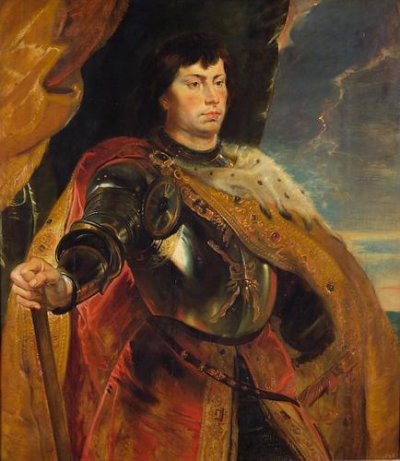 |
Charles the Bold
Charles
the Bold was the mortal enemy of Louis XI, King of
France. Charles held vast amounts of territory
in France, more even than Louis himself.
Charles
was offered the hand of Louis XI's daughter Anne.
The wife he ultimately chose, however, was his
second cousin Margaret of York, sister to Edward IV.
Charles did this in order to ally himself with
Burgundy's old ally England.
Louis XI
had a fit and tried to prevent the marriage with
Margaret. He demanded the Pope refuse to allow
the marriage (the pair were cousins in the 4th
degree), he promised trade favors to the English,
and he undermined Edward's credit with international
bankers to prevent him from paying Margaret's dowry.
Louis
even sent French ships to waylay Margaret as she
sailed to France. Too late. In 1468,
Edward and Charles became good friends as they
celebrated their new alliance over French wine.
|
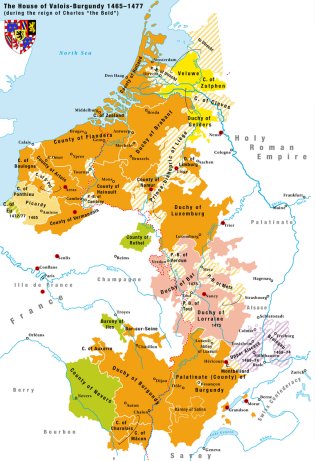 |
Return of the Jedi
After
being exiled from England, Edward landed in
Flanders, the southern part of Holland, in early October 1470.
He had few men and little money. Edward made
his way to see Charles of Burgundy, his
brother-in-law. Charles greeted him
warmly. Edward was also delighted to
be reunited with Margaret of York, his
favorite sister.
|
|
|
Although Charles
was glad to see Edward, at first he refused to
assist him. Margaret pled Edward's case
to her husband.
She pointed out that Edward's overthrow had considerably
lessened
Margaret's dynastic worth.
This, together with her
regard for her brother who
been cheated of his throne made her plead
passionately that Charles support Edward
and make measures to restore him. It
did no good. Charles held his ground and
paid little attention to
Margaret's begging.
Then
something curious happened. You know how I am
about 'Fate'. Edward
caught a huge break when Louis XI suddenly declared
war on Charles the Bold. After Warwick
completed his overthrow, he sent a message to Louis XI, King of France,
that he would send men to help Louis XI overthrow
Charles of Burgundy,
the hated enemy of Louis.
Louis was really excited. Maybe this overthrow
lightning could strike twice!
Charles was more irritated than threatened.
On a whim, he decided it was in his best
interests to oppose the Lancastrian rule of England,
backed as it was by this
pipsqueak Louis XI. Wouldn't it be fun to give
Warwick and Louis the lesson they deserved?
On
4 January 1471, Charles agreed to
help the
King-in-exile
regain the English throne.
At
last furnished with money, on
14 March 1471, Edward and his youngest brother
Richard landed with a small force at Ravenspur.
Doing their best to avoid detection, Edward first returned
to city of York. Suspicious, York opened its
gates to Edward only after he promised that he had
just come to reclaim his dukedom. This was
literally the same scenario as Henry Bolingbroke had
taken seventy years earlier. Lightning would
indeed strike twice, just not the lightning Louis XI
had hoped for.
Edward
was not about to settle for regaining the Duchy of
York. His ambitions were much larger. As
he marched to London over the next month, Edward
picked up support. The first to join him
were Sir James Harrington and William Parr, who
brought 600 men-at-arms to Edward at Doncaster.
Then someone unexpected joined him.
|
 |
| |
|
Coventry
On the
way from York to London, Edward decided to make a
detour to Coventry and challenge Warwick who was
encamped there. Although Warwick's force had
more men than Edward, the earl refused the
challenge. He was waiting for the arrival of
Edward's brother George in order to use their
combined strength to overwhelm the Yorkists.
When
Edward IV learned what Warwick was waiting for,
Edward sent his brother Richard to speak to George.
Six
months earlier,
Edward's brother
George had opposed him during Warwick's successful
third rebellion. After sending Edward fleeing
to France in exile, George was awarded the
Duchy of York for his loyalty,
making him the new Duke of York. Surely that
made George happy. But it didn't. George
was beset with guilt and misgivings.
Previously Warwick
had promised to rebel specifically to put
George on the throne. That failed. The second plot also had
George headed to the throne. That also failed.
Then the objective had changed for the third
rebellion.
George first realized something
was wrong when Warwick had his younger
daughter, Anne Neville, marry Henry VI's son
Edward
of Lancaster
in December 1470.
Currently feeble old Henry VI
was on the
throne, not George. When feeble old Henry did
finally bite the
dust, that would be Margaret's nasty son
Edward taking Henry's place, not George.
Now that George was out of the loop, he realized
Warwick could not have cared less about him.
George
was starting to catch on. George was married
to Isabel Neville and Edward, 17, was recently
married to Anne Neville. If his daughter Anne became Queen
instead of his daughter Isabel, either way Warwick got what he wanted...
one of his two daughters would be the next Queen and the Kingmaker would
be in control.
|
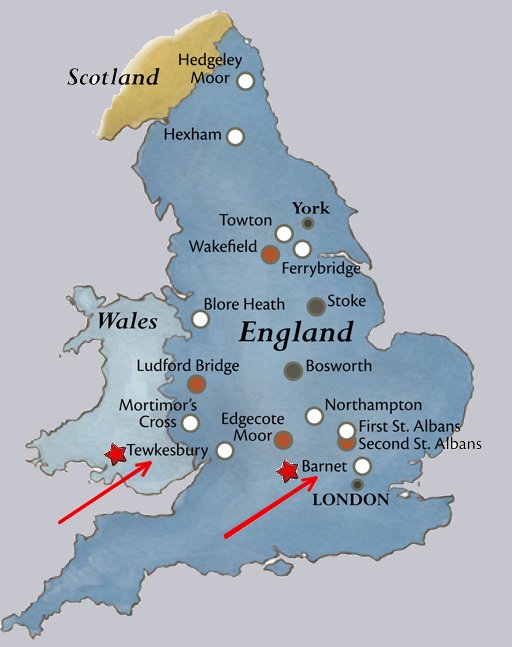 |
| |
|
At this
point, all Warwick wanted from George was more
fighting men. He
realized that his loyalty to
his father-in-law was misplaced.
Aware that his father-in-law was
a lot less interested in making
George
the king than in
serving his own interests,
George realized he had been played.
Meanwhile, Warwick was taking George for granted. Warwick assumed that
George would be satisfied to stay on the Lancaster team
because he was married to Isabel, Warwick's first
daughter, and because he had just been handed the
valuable Duchy of York. Furthermore, through
Isabel, George was currently co-heir to the vast Warwick
estate. Why would George jeopardize his
current land holdings, plus his future inheritance
from Warwick, the richest man in England?
Nevertheless, George felt cheated. There was
no way in hell Warwick would ever put him on the
throne. George had a startling realization...
his fortunes would be better off as brother to the
king than as a nobody under Henry VI and then
eventually Edward of
Lancaster, the new Prince of Wales.
Right
now his younger brother Richard had just asked to
speak to him. George knew what Richard wanted.
He suspected Richard had come to ask George to
return to the House of York. What should he
do? Shakespeare's 'false, fleeting,
perjured Clarence (George)', discontented to now
find himself fighting to maintain the Lancastrian
dynasty, wanted desperately to reinstate himself in
his brother Edward IV's favor. George deserted
his erstwhile ally Warwick, and rejoined his
brother's forces
Reconciled, the three royal brothers moved towards
Coventry. Now George urged Warwick to
surrender. Infuriated with his son-in-law's
treachery, Warwick refused to speak to George.
Edward
was not about to risk attacking Warwick with smaller
numbers, so he turned again towards London. Days
later, when Edward entered London unopposed, George
and Richard were at his side. The old king
greeted his usurper warmly and offered himself into
custody, saying that he trusted Edward. "My
life will be in no danger in Edward's hands."
And with
that, poor old King Henry VI was sent back to the
Tower of London.
|
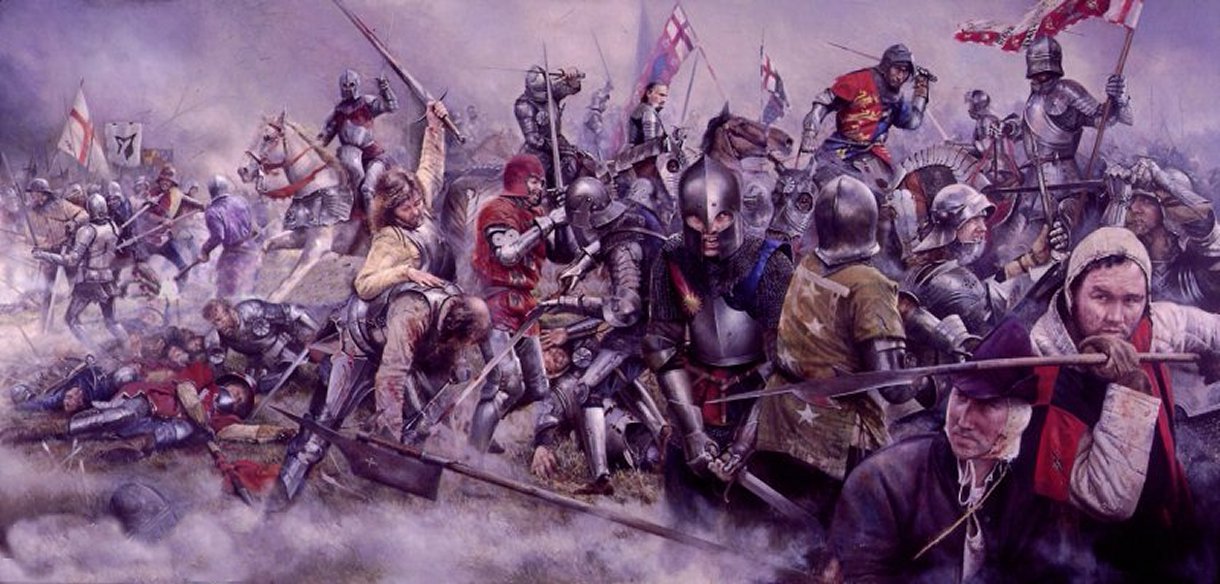
The Battle of Barnet
Warwick
was still fuming over George's last-minute defection
back his brother Edward. Was this a bad omen?
Montagu, Warwick's brother, had once been Edward's
best commander. It had been Montagu's
defection during Warwick's third rebellion that had
turned the tide against Edward in the first place.
Now George was defecting back to his brother's side.
Warwick
dismissed the thought. With George at his
side, Warwick's victory was a slam-dunk certainty.
However, even with the defection, Warwick knew
Edward faced long odds at Barnet, a small town about
12 miles northwest of London. Warwick's army
heavily outnumbered Edward's. Lancastrian
strength ranged around 15,000 men to 10,000 on the
Yorkist side. Furthermore, Warwick had the
advantage of choosing the battleground.
Warwick chose a valley with rolling hills on either
side. In so doing, Warwick wisely chose the
higher ground to the north.
Edward
hurried to meet the Lancastrians hoping to surprise
them. Warwick knew the enemy was near, but
since they arrived in the night was unsure of their
exact location. Edward deployed his trusted
friend Lord Hastings on the left and entrusted his
brother Richard (Gloucester) on the right flank.
Edward
asked George to fight at his side in the center.
He complimented George on his fighting ability as
the reason, but in truth it was easier to keep an
eye on their twice-defected prince there.
As night
fell, Edward put his plan for surprise morning
attack in motion. Under a strict order of silence,
the Yorkist army crept closer to the Lancastrians.
During the night, neither Warwick nor Edward spotted
the opposing army, an event that proved crucial in
the battle the next day.
|
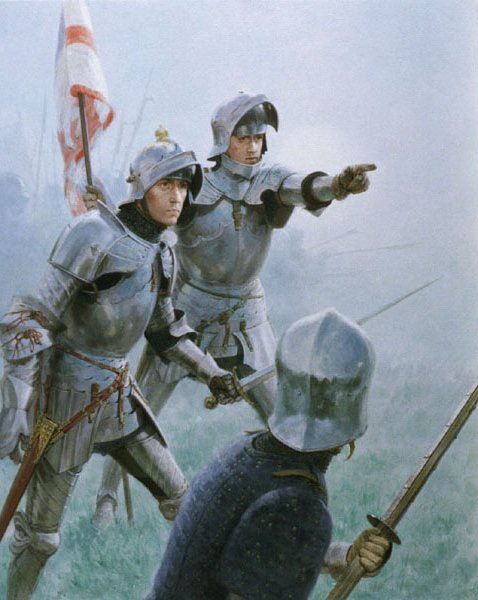 |
| |
|
During
the night, Montagu approached his brother Warwick to
advise him that he felt the troops were skittish.
Montagu suggested that, as the highest-ranking
commanders, he and his brother should fight on foot
throughout the battle instead of riding on horse.
Soldiers believed that mounted commanders tended to
abandon the men when the situation deteriorated.
By staying on foot, the two Nevilles would show
their men that they were prepared to fight to the
death, thus inspiring the troops to stand and fight
harder as well. Warwick agreed and told his aide to
go tether the horses to the rear near Wrotham Wood.
|
| |
|
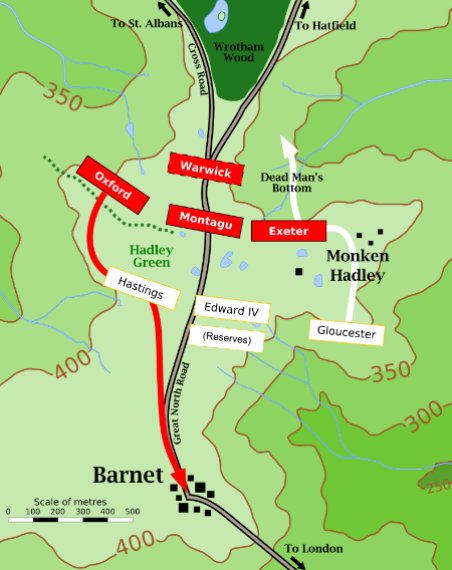 |
Offset Lines
Two key
things happened in the night.
Warwick
ordered his cannons to continually bombard the
estimated position of the Yorkists' encampment.
This gave Edward the advantage of guessing where the
enemy lie. The Yorkists were able to sneak in
so close that the Lancastrian artillery overshot
their enemies. Meanwhile the York side kept
their cannons quiet and lit no fires so as to avoid
betraying their location.
The
right wing of the Lancastrian army was commanded by
John de Vere, Earl of Oxford. Warwick and
Montagu would command the center which straddled the
road. The Lancastrian left wing was headed by
Henry Holland, Duke of Exeter.
Meanwhile, in the night,
Edward had his brother
Richard, the 18 year old
Duke of Gloucester,
extend his line hundreds
of yards too far to the East. Edward
was unaware that there was no enemy to his front,
just a muddy bog.
What
this meant was the opposing sides were not squared
up. On the western side, Lancaster's Lord
Oxford was up on a hill looking down at the left
flank of York's Lord Hastings. These uneven
lines would prove critical in determining the
outcome of tomorrow's battle.
As the
dawn gave light, the opposing sides realized they
were facing each other like a 3 on 3 basketball
game. Lord Oxford was on the hill opposite
Lord Hastings, the Neville brothers and the
Plantagenet brothers were in the center, but Richard
of Gloucester was way off to the right squared off
against a bog.
These
offset lines would create remarkable consequences
during the battle.
|
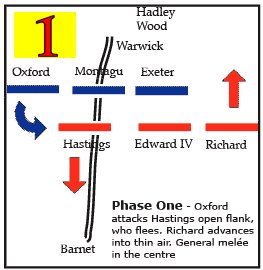 |
Phase One:
Lord Oxford of Lancaster has the
Upper Hand
|
|
|
|
|
The
moment John de Vere, Lord Oxford (Lancaster), discovered that he
was offset well to the outside of Lord Hastings
(York), he ordered his men to charge down the hill
before the York side could fully realign and defend
themselves properly.
In the
mist, Lord Hastings had no idea he was outflanked by
Oxford. His men were not expecting such a
strong force to attack them. Oxford's
group quickly overwhelmed the men under Lord
Hastings who were caught off guard.
Yorkist soldiers panicked and fled
towards Barnet, chased by the Lancastrians.
As it stood, some of the routed
Hastings' men were so certain of defeat that they
grabbed a horse and kept
fleeing all the way to London twelve miles away.
There they spread tales of the fall of York and a
Lancastrian victory.
The fog
would work a strange magic all day long. If
the skies had been clear, the battle would have
already been over. The horror of seeing
Edward's left line collapse would have caused the
rest of Edward's men to quit on the fight and run
for their lives. Instead, due to the fog,
visibility was low, so the two main forces failed to
notice Oxford's victory over Hastings. Unable
to see what was going on around them to the west,
the opposing center forces continued to fight.
Once
Oxford's group of men reached Barnet, they were now
an entire mile south of the main battle line.
Now this early success turned to disaster when
Oxford's forces began pillaging. Oxford's men lost interest in the battle and split off
in order to begin looting
the fallen enemies. Assuming the battle was
over, many of the men took the time to have a beer
in Barnet and celebrate their victory.
Lord
Oxford was furious at the lack of discipline.
Receiving word from Warwick that he was still
needed, Oxford began yelling and chasing after his men.
It took Oxford two hours to gather
800 men from the original 2,000 and lead them back
up to the battlefield. This unusual U-turn on
the part of Lord Oxford's men combined with the fog
and the offset lines would produce one of the
strangest outcomes ever seen on a battlefield.
|
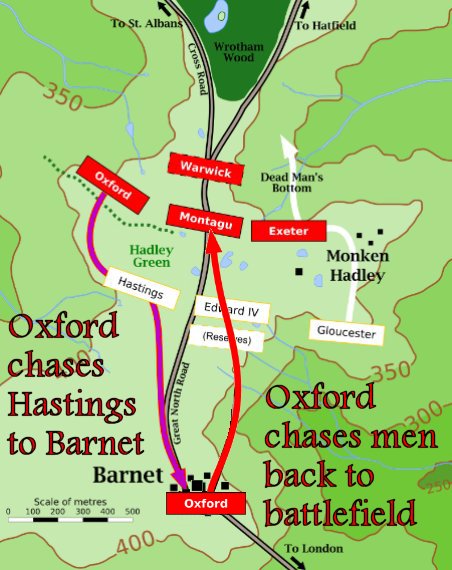 |
| |
|
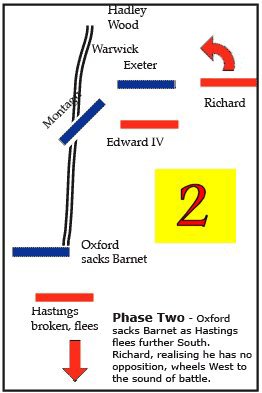 |
Phase Two: Where is the Enemy?
|
'Fog
of War' is a military term for the uncertainty
experienced by participants in military operations.
Medieval battles were notorious for confusion
because visibility and communication were often
limited.
In the
case of the Battle of Barnet, the Fog of War
took on a different meaning... the morning battlefield was totally
covered in thick mist and fog.
The fog created so much confusion that
the fighting would have appeared almost comical if
it weren't for the fact that brave men were dying on
this day.
|
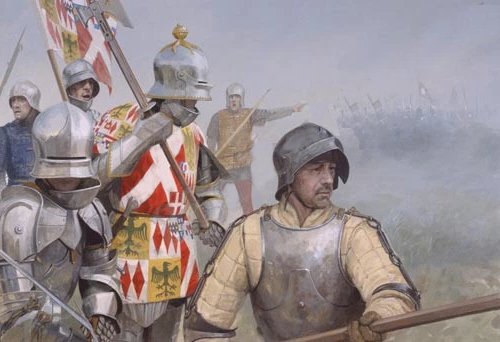 |
|
|
| |
|
At the
same time as Lord Oxford collapsed the left side of
Edward's line, over on the right, Richard, Duke of
Gloucester, discovered there was no one in front of
him. In the fog, he could not see the enemy in
front. Confused, Richard decided his best
option was to proceed forward and look for Lord
Exeter's forces.
And why
was there no one in front of Richard? On the
previous day, Warwick had the luxury of setting his
positions using the light of the day. Seeing
the swampy ground, Warwick correctly assumed no one
would be stupid enough to attack through the
wetlands. Any attack would be easily repelled
because the mud would bog down the enemy's momentum.
Warwick was pleased... this swamp would guard his
left flank for sure!
While
Oxford's men were busy in town having a beer,
Richard was moving cautiously over on the right near
the Hadley Woods. Although Richard saw the
ground was lowering, he continued forward.
When his men reached the boggy ground, Richard still
could not see the enemy, but he was close enough
that he could hear the sound of battle to the west.
Richard
suddenly realized the fog had given him a huge
advantage. His men could now attack Exeter
from the side coming out of the fog to surprise
them. Richard put his finger to his lips and
whispered... "Silence!"
The men
slowly crossed the boggy ground like invisible
ghosts. They used the sound of the clashing
steel to guide them. Richard's men finally
spotted Lord Exeter's Lancaster men at the edge of a
muddy bog known as Dead Man's Bottom.
For the
past hour, some of Exeter's men had helped fight in
the center, but the majority just stood there
looking for someone to fight. Incredibly,
because their enemy had lined up so far to the
right, the Lancaster wing had no idea Richard's men
were approaching. Suddenly out of the gloom
came 2,000 screaming maniacs running right at them!
The Lancaster men were terrified out of their minds.
|
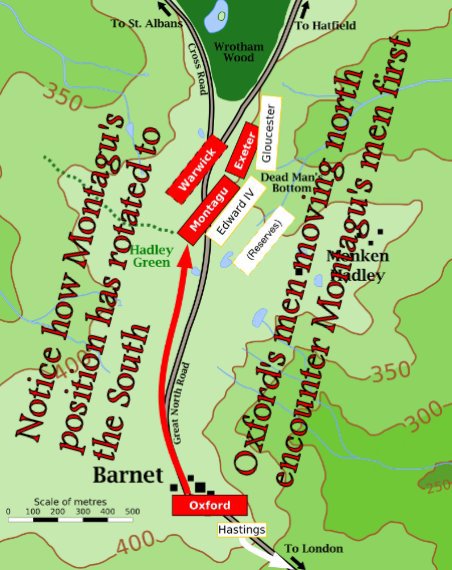 |
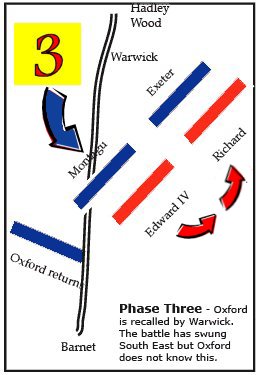 |
Phase
Three: The Sixty Degree Shift
Seeing Richard suddenly appear from the east
was Lord Exeter's worst nightmare.
Shocked by the mysterious sudden appearance
of the charging enemy, the Lancaster general
did his best to rotate his line sixty
degrees to face the east.
Lord Exeter's bizarre rotation affected the
center. On the York side, Edward was
forced to move to his men to the right to
avoid splitting his forces. The last
thing he wanted was a gap between his men
and Richard's. Edward's movement to
the right completely vacated the Great North
Road. Montagu had no choice but to
give chase to Edward's movement. As
Montagu adjusted his forces, his men
occupied the vacuum on the road. First
they moved to the south, then twisted
towards the east.
The ultimate result of this shift is that
now Montagu's forces occupied the same spot
on the Great North Road where Edward's
forces had once been.
Meanwhile, coming up from the south were
Lord Oxford's 800 reinforcements.
Naturally they used the Great North Road as
the fastest route back. They had been
ordered to attack Edward's men from the
rear, an attack which would have been
crippling under ordinary circumstances.
But these were not
ordinary circumstances.
It
was time for the Fog of War to change the
course of history.
|
|
| |
|
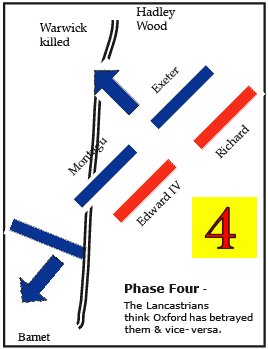 |
Phase Four:
Betrayal
Think
about this... who did Oxford's men expect to meet on
that road?
They
expected to meet Edwards's men who had started the
day occupying the southern part of that road.
But who
did Oxford's men meet on the road instead?
Montagu's men.
Indeed,
Oxford's ragged band of 800 men met Montagu's men
who had rotated over and taken complete possession
of the road. And did the two Lancaster units
merge to overwhelm Edward? No.
What
happened instead is that Montague's soldiers assumed
Edward's rear guard was coming in from the south to
attack them.
Obscured by the mist , Lord
Oxford's 'star with rays' banner was mistaken
for Edward's 'sun in splendor' banner by
Montagu's soldiers. Without hesitation,
Montagu's archers unleashed a deadly volley of
arrows at their Lancaster comrades.
|
Lord
Oxford's men quickly recognized that they were being
shot at by their own men. Oxford and his men
immediately cried 'Treason!' As staunch
Lancastrians, they knew that Montagu, Warwick's
brother, had previously fought for the York side.
Surely
this unprovoked attack was proof that Montagu had
defected back to the Yorkist cause. Oxford's
men briefly struck back, then decided the best thing
to do was withdraw from the battle. The damage
was done. The shouts of treason were taken up
and spread quickly throughout the Lancastrian line,
breaking it apart as men fled in anger, panic and
confusion.
As the
fog started to dissipate, once Edward saw the
Lancastrian center disintegrate, he sent in his
reserves to hasten the collapse. The Lancaster
leaders began to fall. Although not killed,
Lord Exeter fell first. Amidst the confusion,
Lord Montagu was struck in his back and killed by
one of Oxford's men bent on revenge for the supposed
treachery.
Witnessing the demise of his brother, Warwick fled.
The mighty Warwick was killed fleeing the field in a
desperate attempt to reach his horse. The
Devil was dead, the battle was over.
|
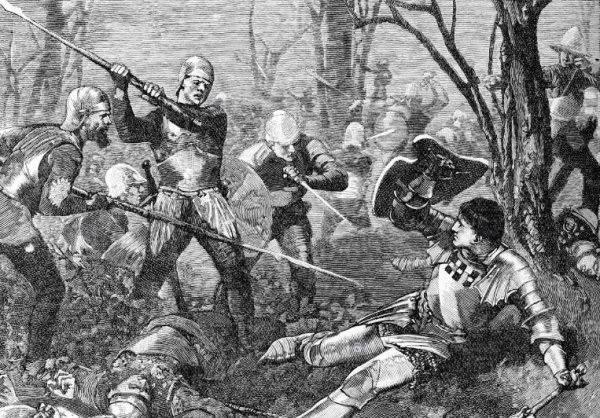 |
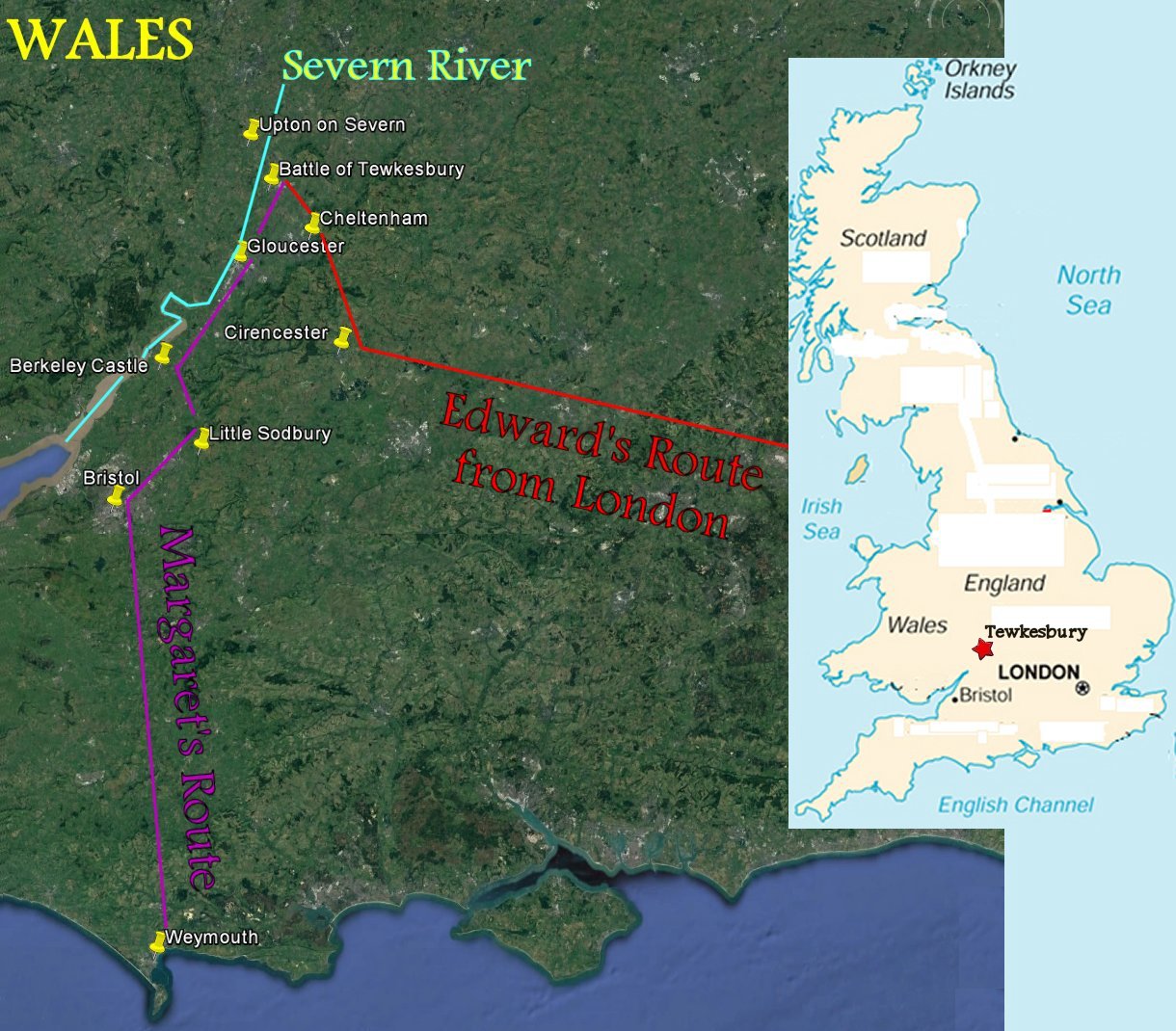 |
Margaret
of Anjou had never trusted Warwick. And who
could blame her? Margaret had adopted a wait
and see attitude about Warwick and his Grand
Alliance. Margaret had
been very slow to follow up on Warwick's expulsion
of Edward IV back in October 1470.
Despite
her eight year absence from England, Margaret was
strangely hesitant. She had been asked to
delay her return to England until Warwick had enough
control of the government to satisfy her patron and
backer Louis XI. Six months after Edward's
October overthrow, Margaret lost her patience and
finally got moving. She
sailed for England on 24 March. Uh oh. A
storm came up. Back to France for safety.
Then another storm came up. Back to France for
safety. Slowed by storms, Margaret and Prince
Edward were delayed by two weeks. They landed at Weymouth on 14 April,
Easter Sunday.
Ironically, this was same day that the disastrous Battle of
Barnet was being fought. Perhaps if Margaret's
forces had been at Warwick's side at Barnet, the
outcome would have been much different. Who
can say?
So why
wasn't Margaret at Warwick's side?
Keep in
mind that communication was very slow in those days.
Although Margaret had received the promising report
that Warwick was now running the government in
England, she had not received the reports that
Edward had landed on the English coast on 14 March.
Those same storms which prevented Margaret from
leaving France also prevented ships from landing in
France to give her the updated information on
Edward's new threat. If she had known of
Edward's threat to Warwick, she would have headed
directly for London with her army instead of landing
two hundred miles away in Weymouth.
While
Margaret sheltered at Cerne Abbey near Weymouth, the
Duke of Somerset, Edmund Beaufort, brought news of
the disaster at Barnet to her. What a blow it
must have been for Margaret to discover Warwick's
demise. Margaret
immediately wanted to leave and head back for the
safety of France. Edmund Beaufort suggested they stay
and fight. Now that Warwick had fallen,
Beaufort pointed out they might not get another
chance like this. This moment carried the
sense of 'Last Shot'.
Edmund
Beaufort, 33, was the new commander of Margaret's
army. Edmund was the son of Margaret's
one-time lover
Edmund Beaufort, the man who had died at the First
Battle of St. Albans back in 1955. Edmund was
also the
brother of Henry Beaufort who had commanded the
Lancastrian forces for nine years following his
father's death. Henry had died at the
Battle of Hexham in 1464. Now it was the
junior Edmund's turn to run the show along with his
younger brother John Beaufort. One can only
wonder if either son knew that their deceased father was
also the likely father of Margaret's son Edward.
In other words, Prince Edward was likely their
half-brother.
Sometimes the truth is stranger than fiction.
| |
|
So what
should Margaret do? Margaret
dearly wished to return to France, but her commander
said that if they could join up with the powerful army
waiting for them in Wales, they had an excellent
chance of unseating Edward IV themselves.
Margaret turned to her 17-year-old son Edward and
asked him what he wanted to do.
Prince Edward
persuaded his mother to gamble for victory.
They had landed in Lancaster country. Somerset
and the Earl of Devon had already raised an army for
Lancaster here in the countryside of west England.
Their best hope was to march northwards and join
forces with the Lancastrians in Wales. And
with that, Margaret was persuaded.
In
London, King Edward learned of Margaret's landing.
Realizing the She-devil was loose in the west, Edward moved swiftly to meet her. However he
was unsure of her destination. As it turns
out, Wales was equidistant for both parties 125
miles away. The advantage was on Margaret's
side because she knew where she was going and Edward
didn't. However, Edward's advantage was that
at first Margaret did not know he was chasing her,
so she took her sweet time getting there.
The race to
Wales was on.
|
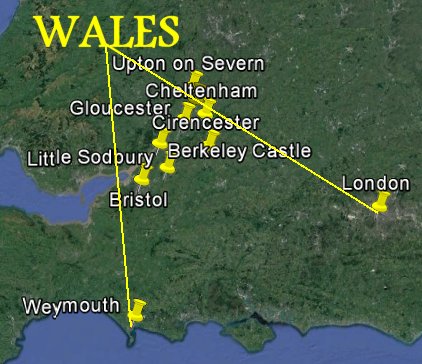 |
| |
|
By 30
April, Margaret's army had reached Bristol
on its way towards Wales. On the same
day, King Edward reached Cirencester,
just 30 miles northeast of Margaret's position.
On hearing that Margaret was at Bristol, he turned
south to meet her army. However, the Lancastrians
made a feint towards Little Sodbury,
halfway between Bristol and Cirencester.
Nearby was Sodbury Hill, an Iron Age hill fort which
was an obvious strategic point for the Lancastrians
to seize. When Yorkist scouts reached the hill,
there was a sharp fight in which they suffered heavy
casualties. Believing that the Lancastrians were
about to offer battle, Edward temporarily halted his
army while the stragglers caught up and the
remainder could rest after their rapid march from
Windsor.
And with
that, Margaret's trick had worked. With Edward
preoccupied with her Sodbury Hill diversion, she was
able to sneak away. The Lancastrians instead
made a swift move north by night, passing undetected
within 3 miles of Edward's army. By the
morning of 2 May, they had gained the safety of
Berkeley Castle and had a head start of
15 miles over Edward in the race to the bridge at
Gloucester.
Now King Edward guessed what Margaret was up to.
No doubt the Lancastrians were seeking to cross the
River Severn into Wales. The nearest
river crossing point they could use was at the city
of Gloucester. Edward sent his
horsemen to deliver an urgent message to Sir
Richard Beauchamp, the Governor, ordering him to bar
the gates to Margaret and man the city's defenses.
This was a critical move.
Beauchamp's father
had been a Lancaster. What should he do?
Defy his king and let Margaret through? If he
told Margaret 'no', then he risked having her
attack his city. Given the mood she was in,
this was a real possibility. Why not let her
through and avoid the bloodshed?
Then it
occurred to Beauchamp that he would
likely have to face Edward the next day. If he
wanted to keep his
head on his shoulders, he might want to follow
Edward's orders. Tough choice... risk the
lives of the citizens of Gloucester or risk his own
head?
Edward
was probably the better choice, so Beauchamp
cleverly decided to support Edward IV. On the
morning of Friday, 3 May 1471,
Beauchamp threw aside his father's Lancastrian ties
and held the gates of Gloucester closed against Queen
Margaret.
This prevented her army's use of the Severn Bridge
and her escape route into Wales. Beauchamp
wasn't done yet. As Margaret moved north, he
harried the Lancastrian rear and captured some guns
on the road to Tewkesbury. Beauchamp fought at
the battle of Tewkesbury and was knighted.
Quite likely, this one man changed the course of
English history.
When
Beauchamp refused Margaret's summons to let her army
pass, Margaret and Edmund Beaufort had enough men to
take the bridge by force... but they didn't have
enough time. Margaret realized she had
insufficient time to storm the city before Edward's
army arrived. Instead, her army made
another forced march of 10 miles along the river to
Tewkesbury. Margaret was racing Edward to beat
him to the next bridge at Upton-upon-Severn,
7 miles further up the river.
Edward
meanwhile was in a hurry. He had marched no
less than 31 miles, passing through Cheltenham
in the late afternoon. The day was very hot,
and both the Lancastrians and Edward's pursuing army
became exhausted from all the marching. The
Lancastrians were forced to abandon some of their
artillery, which was captured by Yorkist
reinforcements trailing Margaret from Gloucester.
This would prove significant.
At Tewkesbury, the tired Lancastrians
halted for the night. Most of their army were
footmen, and unable to continue further without
rest. Even the mounted troops were weary.
Hearing from his scouts of Margaret's position,
Edward drove his army to make another march of 6
miles from Cheltenham to a spot near Tewkesbury,
finally halting 3 miles from the Lancastrians. The
Lancastrians knew they could retreat no further
before Edward attacked their rear. Edward had
Margaret cornered. It was time to stop
running.
|
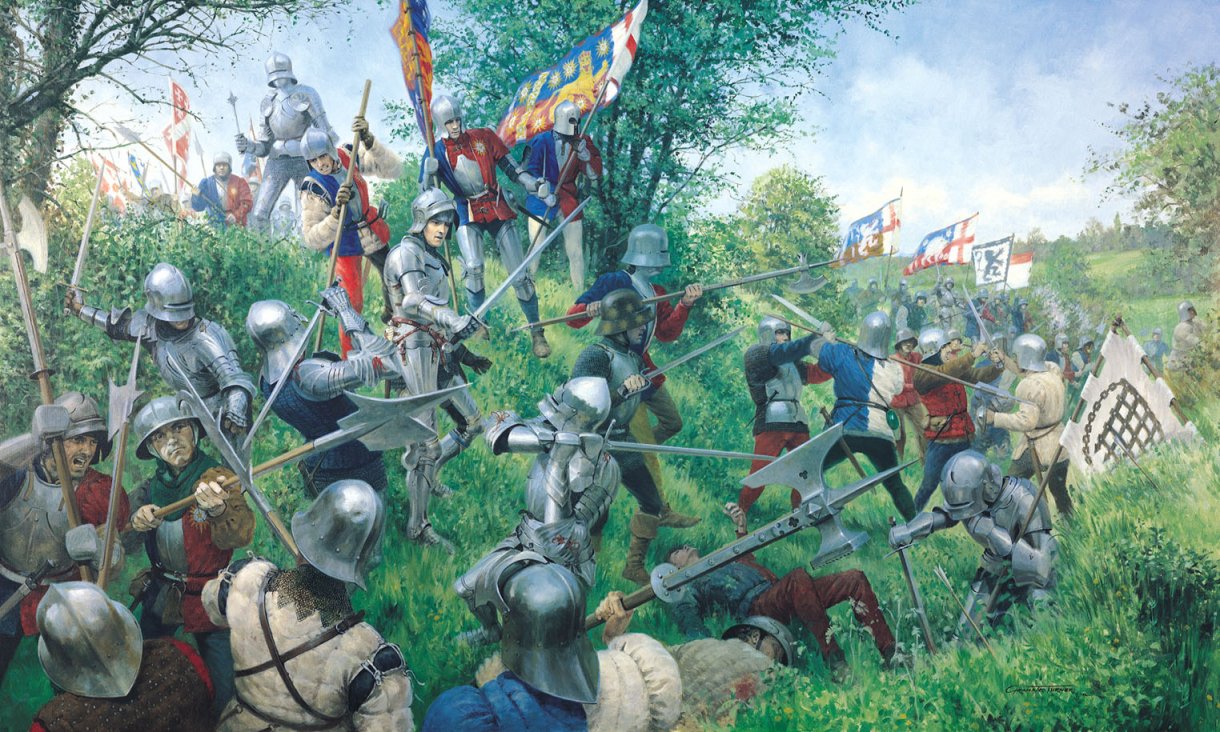
The Battle of
Tewkesbury
|
|
Margaret's
decision to stand and fight at Tewkesbury
was an all or nothing gamble, perhaps
the last desperate roll
of the dice for a queen robbed of a kingdom.
It is likely there were plans for
Prince Edward to take over from his ailing father
Henry if the Lancasters were
victorious today.
Prince Edward's reputation
was riding on the outcome. The Prince would need to
prove that he was greater
than his father, a weakling who
had allowed England to slide into
a crippling mess.
The Prince would need to prove that he was greater
than his opponent, the formidable King Edward IV.
That
would not be easy.
King Edward had
built his reputation on martial prowess and
had won his
throne in battle twice over...
Towton and Barnet.
It must
have been intimidating for Margaret and Prince
Edward to see the three brothers - Edward,
George, Richard - battle-tested, mounted on
horseback, united in arms. There was no escape
route
for Margaret and Edward. Nor would there be
any mercy. This was it. This was a fight
to the finish, Prince Edward versus King Edward.
|
| |
Unlike
the Battle of Barnet where Edward had won a fluke
victory against a superior army, this time he had
most of the advantages. The new Lancaster leader,
Edmund Beaufort, Duke of Somerset, had his back to
the river with no easy escape routes. Even if Beaufort's men
ran, they were on foot while Edward had mounted
men if necessary.
Based on
his experience at Barnet, Edward noted the Lancasters had
chosen the location again. Assuming there must be a
reason, Edward was concerned about a thickly wooded
park to the left of his army. Suspecting that
hidden Lancastrians might attack from this quarter,
he ordered 200 mounted spearmen to occupy a corner
of the woods and prevent the Lancastrians from
making use of this cover to ambush his left flank.
Edward told the horsemen to act on their own
initiative if they saw an opportunity.
Another
key move was to move Hastings to the right and
Richard to the left. Hastings, 40, was Edwards
best friend. Friendship aside, Edward put his
brother Richard on the
left next to those dangerous woods. Edward was
showing his experience. He had fought so many battles at
this point that he had become a superior general.
The Battle of Barnet had shown him that even though
Richard was only 18, he was a talented fighter.
|
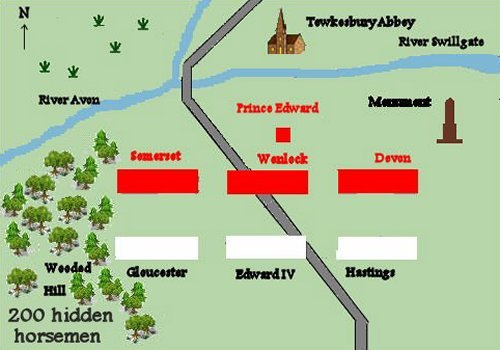 |
| |
|
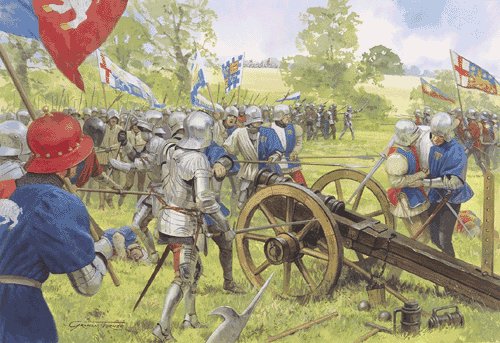 |
As
usual, the Lancasters had more men. Their
6,000 matched up well against the 5,000 Yorkists. Edward
soon discovered why Somerset had chosen this
location. The hilly terrain contained valleys,
disguised gullies and thick hedges, all of which made it
difficult for Edward to attack uphill. So
Edward was content to bombard the Lancasters with
arrows and cannon.
The War
of the Roses was now in its 20th year. The War had been going on for so long that
artillery had recently been introduced.
Understandably, there was great terror attached to
the horrible sound of the exploding cannons and
the whistling cannonballs. Beaufort could see his
men were terrified under the onslaught. The
barrage of arrows was frightening as well. Few of
the men had shields and there was nowhere to go for
protection. The psychological aspect of the
bombardment was devastating. Since Somerset had left
his artillery behind in order to pick up speed, he could not fire
back.
Although Commander Beaufort's
position was almost unassailable,
for some unknown reason, after the battle
began, he moved down from
the heights and attacked Edward IV's flank.
He
must have felt trapped and could not sit still any longer... his men were
dying without even fighting!
|
| |
|
|
Either to escape the arrows and cannonballs or
because he saw an opportunity to outflank King
Edward's isolated men near the woods, Beaufort
(Somerset) decided to be aggressive. He led
part of his men through a gulley that hid them from
sight to attack the York left flank defended by
Richard, Duke of Gloucester. Although taken by
surprise, Richard and his men resisted stoutly,
beating back Somerset's surprise attack among the
hedges, tree and embankments.
|
| |
|
At the
vital moment, the 200 spearmen Edward had posted
earlier in the woods attacked Somerset on his
exposed right flank and rear. This was the
'Kill Shot'. Somerset's desperate
gamble had failed.
Beaufort was assailed by both the king and
Richard, Duke of Gloucester, and was soon put to
flight. His
rash conduct had
decided the battle in favor of the Yorkists.
Now
badly out of position, the Lancaster army was easily
routed. The surviving
army tried to escape across the Severn River, but it did
little good. Most of them couldn't swim
anyway. Edward's horsemen gave easy
chase, cutting the enemy down as they fled.
Edmund
Beaufort was caught and beheaded. His younger
brother John Beaufort who had fought beside him was
executed as well.
With the death of John and
Edmund, the legitimate male line of the Beauforts
ended. This line which dated 120 years back to their forefathter John of Gaunt
was gone for good.
Edward,
the Prince of
Wales, was found
full of grief in a grove.
Richard and George were summoned. Edward tearfully
pleaded for his life to
George for mercy. He reminded
George that he had sworn
allegiance to Edward in France barely a year before.
Edward begged George to honor his oath and set
him free.
If
anything, that made George mad. The original plan had
been to make George king, not Edward. George
refused to listen
to the Prince’s whining.
With little fanfare, he had the lad
summarily executed on a makeshift block in the field.
|
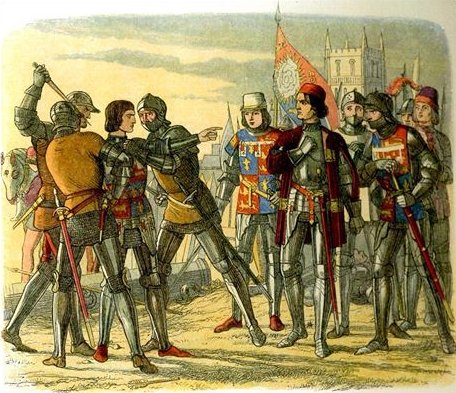 |
| |
|
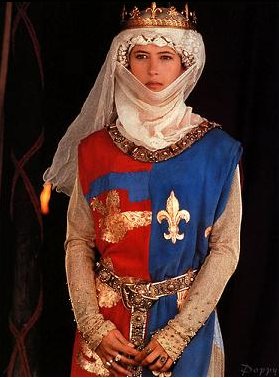 |
United we Stand, Divided we Fall
The
indomitable Queen Margaret
was defeated at
last. She was crushed
by the death of the son Edward
she had fought so long
and hard for. After she was taken captive by William Stanley, Margaret
and her senile husband Henry were
taken back to London with King Edward.
Henry died in the Tower of London, presumably
murdered during a midnight visit
from Edward and Richard. Henry was only
49, but seemed much older. One can only assume
his death was unannounced and that he was quickly forgotten.
What a sad epitaph.
Margaret
of Anjou stayed imprisoned in England for five years.
Those were
surely difficult years for her. Margaret was
understandably heartbroken by the loss of her only son,
her entire reason for existence. During
her imprisonment, she had plenty of opportunity to
reflect on her decision to trust her fortunes to
Richard Neville, the erstwhile Earl of Warwick
better known as the Kingmaker.
What
bothered Margaret was just how close she had come to
fulfilling her dream. Margaret had
never trusted Warwick, but cooperated anyway because
he offered her the best chance to put her son on the
throne. Unfortunately, her distrust ending up
costing her dearly.
Her problem was
deciding who she should listen to... Warwick or Louis XI.
|
| |
|
Warwick
was in a tough spot. After his overthrow of
Edward in October 1470, he had promised King Louis
XI to declare for France and against Charles in
Burgundy. Now to his consternation, Warwick's
hands were tied. He could not attack Charles
because the London merchants preferred to support
Charles the Bold of Burgundy for financial reasons.
Consequently the London bankers refused to loan
Warwick enough money to help guard against a
potential counterattack by Edward, much less attack
Charles. Louis XI lost his patience with
Warwick and declared war on Charles the Bold
himself. Big mistake. Charles had seen
Edward's presence as a refugee in Flanders as a
nuisance. However, once Louis XI irritated him
sufficiently, Charles decided to sponsor Edward's
return to England to overthrow Warwick. The
politics backfired for virtually everyone in this
story but Edward IV.
If
Margaret had ignored Louis XI's command to delay her
trip to England, the outcome would have likely been
different. There is one constant theme in
these stories... the two sides were evenly matched.
It always came down to who defected at the last
minute or who showed up at the last minute to shift
the balance. In Margaret's case, her delay
cost her dearly. By dawdling in France for six
months after Edward's October 1470 overthrow,
Margaret was unable to help Warwick thwart Edward's
miraculous comeback.
|
| |
|
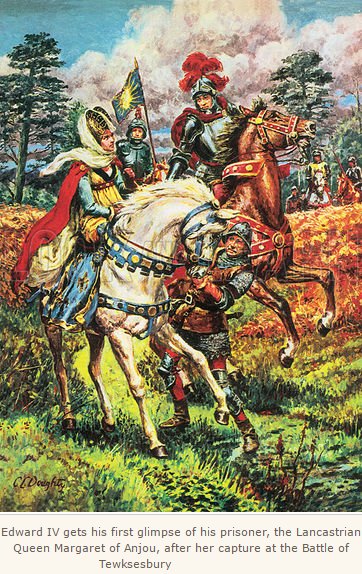 |
But then
again, perhaps some things are meant to be.
The Lancasters should never have lost the Battle of
Barnet. Never. If Margaret had been
there, they would have been too strong. If
George had not changed sides at the last minute,
they would have been too strong. If not for
the Fog of War, Montagu would never have mistaken
Lord Oxford for the enemy.
No doubt
the Weymouth decision also weighed upon Margaret's
thoughts. The moment she landed in Weymouth,
Margaret discovered that everything that could go
wrong had gone wrong so far... Edward IV had
returned, Warwick had been defeated at Barnet, and
George, the Duke of Clarence, had defected back
to his brother. Margaret's instinct
was to flee to safety while she still had ships
in the harbor, but she had let her son talk her out of
it. So much for the wisdom of a cocky teenager
with little military experience other than watching
battles while hiding behind a tree at his mother's
side.
The main upshot of the
Tewkesbury defeat is
that Edward and his brothers executed every last
Lancaster of note who had fought against them in
this battle. Once Prince Edward was killed and
Henry VI was executed, the noble House of Lancaster
was officially eliminated in the male line.
Margaret of Anjou was faced with the bitter fact that the
vast House of Lancaster had been exterminated trying
to put her son on the throne.
Margaret
had gone from being Queen of England to being a
childless widow. She remained in royal custody for
the five years until she was finally ransomed by
Louis XI in 1476 and returned to France. While
in France, she was practically disowned by her
elderly father and was forced by the king to
renounce any claim to her inheritance as a way of
paying for her large ransom.
In 1482
Margaret, the woman who had acted as king, died alone. She was a broken woman
with little to call her own. She was 52. This
was indeed a tragic end for the woman who had once
been so powerful in an age dominated by men.
|
This
picture depicts a group of men meeting to discuss
solutions to the animosity between the Lancasters
and the Yorks. In order to show where their
loyalties lay, they each picked a red rose or a
white rose ahead of time so that everyone in the
group knew where they stood.
Margaret
of Anjou was not the only desolate one. Now that the
House of Lancaster had lost all their leaders,
the House
became extinct in the male
line. The
Lancastrian cause was lost
forever. Consequently,
the Battle of Tewkesbury marked the end of hostility between the
Houses of York and Lancaster. Or
did it??
One
would assumed the
Wars of the Roses ended at
Tewkesbury Abbey, where the final petal of the red
rose fell to the ground.
Nevertheless,
the War was not over. The men were dead, but
not the women!! Although the War went dormant,
it awaited
another chance to erupt anew.
The new opponent would not be
usual Lancasters.
That fight
was over.
Instead, a whole new set of faces would
appear to take up the ancient battle. It ain't
over till it's over.
|
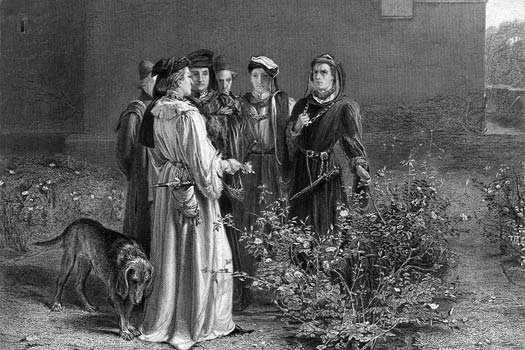 |
|